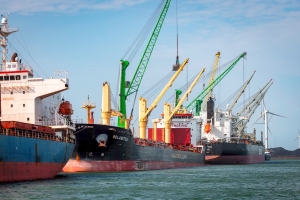


(Posted on 20/01/25)
In 2024, the North Sea Port companies recorded a volume of 66.3 million tons of seaborne cargo transhipment, an increase of 0.7% compared to 2023. Inland navigation rose by 4.4%. These increases are encouraging in themselves, but especially so given current economic and geopolitical developments.
Seaborne transhipment increased by 0.4 million tons of goods compared to the serious dip in 2023. This slight improvement is due to North Sea Port's distinctive profile as a bulk port: dry bulk and break bulk (general cargo) throughput increased significantly. The diversification of activities at the port often provides a counterbalance in uncertain times – on the other side of the scale, liquid bulk transhipment fell. The decline of specific products linked to a (cautious) industrial sector is making its impact felt in the port.
Seaborne transhipment with Great Britain actually increased by more than a quarter, making it the number one trading partner. The impact of Brexit seems to be a thing of the past in terms of tons of goods transhipment, and North Sea Port continues to strengthen its role as a port firmly positioned in the heart of Europe.
Inland waterway transhipment is prospering, posting growth of just under 5%. North Sea Port’s ideal location at the intersection of Western European inland waterways, excellent port infrastructure and modal shift projects aimed at transporting more goods via inland waterways are boosting this sustainable form of transport. And, not least, the distinctive nature of the products handled in the port – specifically bulk goods – lends itself perfectly to inland navigation.
The challenges for the years ahead are many – certainly on the geopolitical front, with the Russia-Ukraine war and ongoing tensions in the Middle East, as well as the United States and possible trade barriers. In addition, there has been a slowdown in the energy transition and there remains an urgent need for a level and competitive playing field within Europe and a European Industrial Deal.
However, North Sea Port looks forward to significant investment in the coming years. The raft of upcoming investments for 2025 in the energy, offshore, logistics and circularity sectors offer the prospect of additional jobs and additional financial security for the port authority. North Sea Port expects to release 30 hectares of land by 2025, the same amount as in 2024.
North Sea Port remains, above all, a bulk port. Dry and liquid bulk still make up a full three quarters of transhipment. Dry bulk increased again (+2.1%) and continues to account for more than half (54%) of all transhipment (35.9 million tons). The rise was the result of increased supplies of iron ore, wood pellets, chemicals and soya beans. The transhipment of construction materials kept pace, while that of rapeseed decreased.
Break bulk also grew (+7%) and continues to represent 15% of throughput (10.2 million tons). Within that figure, cellulose transhipment increased, while sheet steel decreased.
With this year’s Rail Conference “Rail Freight Transport and Seaports”, a joint initiative... Read more
Asian Bulk Logistics (ABL Group) and ICG have jointly announced the successful completion of ABL&rsquo... Read more
Abu Dhabi based AD Ports Group, a leading global enabler of integrated trade, industry and logistics... Read more
The Executive Board of Hamburger Hafen und Logistik AG (HHLA) has appointed Patrick Krawutschke as Managing... Read more
Abu Dhabi based AD Ports Group, a global enabler of integrated trade, transport, industry, and logistics... Read more
This year marks a significant milestone in maritime innovation as Port Hedland, Australia, celebrates... Read more
Associated British Ports (ABP), the UK’s leading port operator, has announced the latest tranche... Read more
During the Investment, Labour, and Trade Promotion Programme in Japan (November 16–22, 2025),... Read more
AD Ports Group subsidiary Khalifa Economic Zones Abu Dhabi - KEZAD Group, the largest operator of integrated... Read more
Abu Dhabi based AD Ports Group, a global enabler of integrated trade, transport, industry, and logistics... Read more